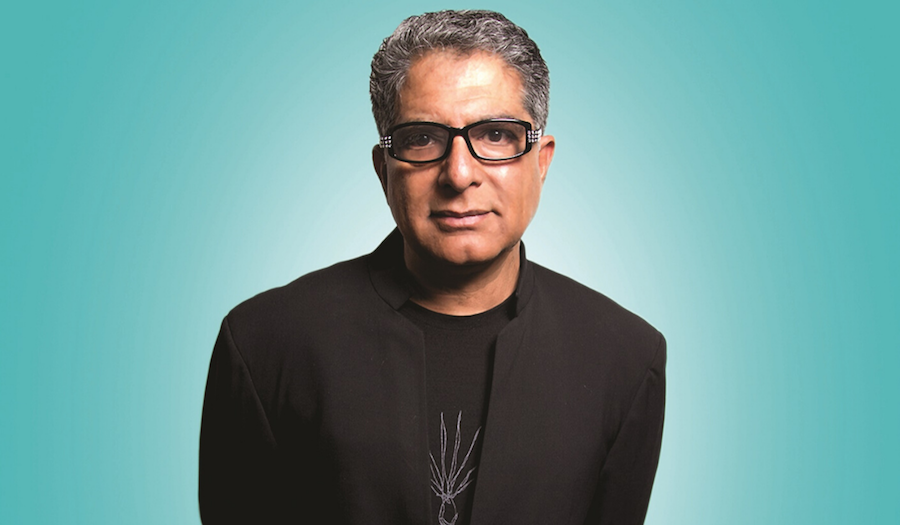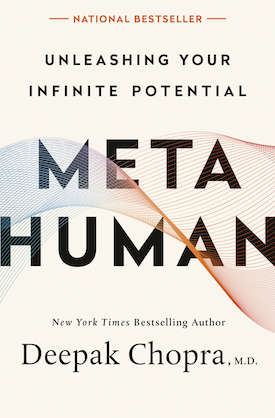Why Being ‘Metahuman’ is the Choice of a Lifetime

There are many things people do to improve their lives. You might say that developed societies live in a golden age, as far as standard of living goes. It has become realistic to look forward to decades of good health, to eat organic whole foods available around the corner, not to mention having things that were once out of reach for the average person, such as owning your own home and retiring in relative security.
It is strange, then, that millions of people strive to improve their lives without improving their personal reality. The two are intimately entwined, and if you don’t improve your reality, there’s something shaky and unreliable about improving your life. Reality isn’t simply the world “out there”—it is very personal. Two commuters going to the same job might look at the world entirely differently, one feeling anxious about job security and the prospect of being fired, the other placidly content and optimistic. Giving birth could be the same physical event, without any medical complications, for two new mothers, but one might suffer from postpartum depression while the other is filled with maternal joy.
Personal reality defines us. It consists of all the things we believe in, the emotions we feel, our unique set of memories, and a lifetime of experiences and relationships. Nothing is more decisive in how a person’s life turns out. So it is peculiar—one might say profoundly mysterious—that we build our lives on a deep lack of knowledge about who we really are. Delve into any basic issue about human existence, and behind the façade of expert opinion lies a blankness where understanding should be.
We have no idea why humans are designed to both love and hate, preach peace and practice violence, swing between happiness and despair, and lead lives governed by confidence one moment and self-doubt the next. Right now you are acting out in your own fashion all these contradictions. You are a mystery to yourself, because everyone is a mystery to themselves. What keeps people moving forward is the routine of everyday life and the hope that nothing goes horribly wrong.
I’m not devaluing the things most people live for—family, work, and relationships. But, to be blunt, we don’t manage even the most important things with any confidence that we know what we’re doing. It’s no wonder that we spend so much time working to improve our lives and so little working to improve our reality. Reality is too confusing. We are better off ignoring the deep water and remaining where it is safe in the shallows.
A handful of people, however, have ventured into deeper waters, and in every culture they bring back reports that are alien and inspiring at the same time. It’s inspiring to love your enemies, but who really does? Being told that divine love is infinite doesn’t make it so in your reality. Eternal peace vies with the prospect of crime, war, and violence in every age. A handful of people are cherished as saints, with a good chance they will be labeled as mad instead, or simply dismissed as too good for this world. Yet one thing is beyond doubt—personal reality is where the whole game is played. It contains all the potential that humans have fulfilled, but also all the limitations that hold us back. A New York psychologist named Abraham Maslow, who died in 1970, continues to be famous today because he swam against the tide. Where the typical career in psychology consisted of examining the ills and defects of the psyche,
Maslow felt that human nature went far beyond everyday experience. His core idea, which has now blossomed far beyond anything he could have imagined, is that humans are designed for extraordinary heights of experience, and, more than that, we should be creating these experiences in everyday life. It was as if the only cars that were on the road were junky rust heaps, and someone announced that you could trade in your clunker for a Mercedes or Jaguar.
If the only cars you see are junk heaps and the Mercedes and Jaguars exist far across the ocean, your reality won’t change. But Maslow, drawing on centuries of spiritual aspirations, insisted that the peak experiences in life are part of our design, that we need and crave them. The key was to go beyond the everyday.
The notion of going beyond became the motivation for this book.
To discover who you really are, you must go beyond who you think you are. To find peace, you must go beyond fear. To experience unconditional love, you must go beyond conditional love, the kind that comes and goes. I even thought for a time that this book should simply be titled Beyond. Instead, I chose Metahuman, using the Greek word meta, which I noted earlier means “beyond.” My thesis is that becoming metahuman is a major shift of identity that anyone can make. Being designed for peak experiences raises the question of whether we have a choice. Often the most illuminating moments in life descend as if from another, higher plane by themselves. How do we know they aren’t accidental?
At a recent conference on science and consciousness, a young woman introduced herself, telling me that she was writing her graduate thesis on communicating with birds. I asked her how talking to birds was possible, and she replied that it was easier to show me than to tell me. We went outside. It was a bright day, and we sat quietly on a bench. She looked up at some birds sitting in a tree nearby, and one of them flew down and landed unafraid in her lap.
How did she do it? Feeling no need for words, she gave me a look that said, “See? It’s very simple.” My old Catholic schoolteachers would have pointed to St. Francis of Assisi, who is often portrayed beatifically with birds fluttering to him. From the Indian tradition, I thought of a quality in consciousness known as ahimsa, which means “harmlessness,” the empathy extended to all living things.
In either case, it wasn’t a matter of talking to the birds or knowing their language—the whole thing had taken place silently. It was a perfect example of going beyond—in this case, going beyond my own expectations. What the young woman did, she explained later, was to have mental clarity and insert an intention for the bird to come to her. In other words, it all happened in consciousness.
So few people have such experiences that it only magnifies the need to show how much choice we really have to go beyond. My strong feeling is that we have much more control over life than we currently realize.
To me, metahuman is the choice of a lifetime. Peak experiences are only the beginning, a glimpse at what is possible.
The term peak experience has become popular enough that most people have a general sense of what it means. The term describes moments when limitations drop away and life-changing insights come our way or a superb performance happens effortlessly. The quarterback in NFL football who approaches age forty with multiple Super Bowl wins, the musical prodigy who debuts in a Mozart piano concerto at age eight, the mathematical whiz who can multiply two eighteen-digit numbers in a matter of seconds—we don’t have to search far to find stories of peak performance like these that hint at enormously expanded human potential. But these accomplishments, astonishing as they are, occupy a specific niche. When fame and fortune are lavished on the exceptional few, we miss a much greater possibility that applies to the many.
Reality is much more malleable than anyone supposes. Most of the limitations that you feel are imposed on you personally are actually self-imposed. Not knowing who you really are keeps you stuck in secondhand beliefs, nursing old wounds, following outworn conditioning, and suffering a sense of self-doubt and self-judgment. No one’s life is free of these limitations. The ordinary world, and our ordinary lives in the world, are not sufficient to reveal who we really are—quite the opposite. The ordinary world has deceived us, and this deception runs so deep that we have molded ourselves to conform to it. In law, tainted evidence is known as the “fruit of the poisonous tree.” It’s not an exaggeration to say that as good as life can get, there is still a taint stemming from the deceptions we mistake for reality. Nothing, however beautiful and good, has completely escaped this taint. Going beyond is the only way to escape it.
A metahuman is someone whose personality is based on higher values; not just peak experiences, but love and self-worth. After finishing this book I was delighted to find that Maslow had actually used the term metahuman in exactly this way. (He didn’t associate it with comic book superheroes, and neither do I. While fantasy metahumans are persecuted as freaks and threats to society, this is a connotation to be avoided completely.)
It’s all well and good to consider certain experiences so exalted that they seem divine, which is where Maslow placed metahuman. It was an important step to declare that aspiring to reach God or eternal peace and love is just as real as driving in a nail. But I will argue that becoming metahuman is an urgent necessity. It is the only way out of the illusions that play out in our lives as inner suffering, confusion, and conflict.

Excerpted from METAHUMAN Copyright © 2019 by Deepak Chopra. Published by Harmony Books, an imprint of Penguin Random House.
This excerpt was featured in the November 17th edition of The Sunday Paper. The Sunday Paper inspires hearts and minds to rise above the noise. To get The Sunday Paper delivered to your inbox each Sunday morning for free, click here to subscribe.


